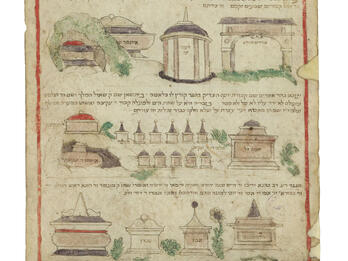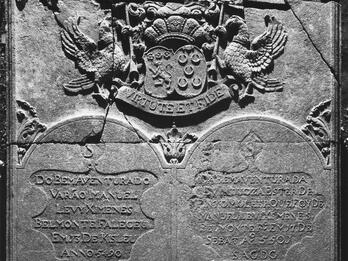Tombstone Inscriptions (Istanbul)
Hasköy Cemetery
Yesterday I was playing on the earth, in my husband’s embrace, like a tiny lamb, And an angel came and preyed upon me in his wrath, placing me in a wilderness full of snakes. The tombstone [marking] the burial [cave] of a woman of great consequence, renowned daughter of the king, a woman of virtue is a crown of glory among women, you are the woman who quarries her tomb in the rock, the crowned lady, Mistress Mikri, may her soul rest in Eden, wife of the exalted, wise man R. Yehuda Hamon, may the Merciful One protect him and redeem him. Passed away on the sixth day [of the week], the twenty-third of the month of Shevat, 5402. May she rest in dignity.
Mevorakh Roman, Husband of Mazal Tov (d. 1643)
Hasköy Cemetery
As a witness to all [passersby] who will ask: “Whose burial cave is this?” Think of the end of each and every man to be chiseled in stone and be wrapped in a cloth shroud, as you stand at the entrance [of the cave]. And when all is said and done you will learn; at the end of your days, you may rely [on this fact], for this is the lot of man. In his lifetime he foresees and beholds a multitude of signs punctured in chalk blocks,1 instructing and also reciting: “Worship the Lord in the councils.” Every person is in pain: That a father has been entombed: He is a father to his entire family: He went to worship the Lord in [the month] of Av: For he is the old wise one, the honoured rabbi Mevorakh Roman, may his soul be bound up in the bond of eternal life, who was invited to the [heavenly] academy on the tenth of Av, on the first day [of the week], 5403. And may he rest in dignity.
Mazal Ṭov bat Teshuva Roman (d. 1643)
Hasköy Cemetery
This will be called a headstone: for weeping and eulogizing a firstborn child, an only child, a young betrothed maiden: for her joy has been transformed into [cries of] lamentation and wailing: and her father and mother are bitter, for the Lord God took her from them [when she was] fifteen years old, as beautiful as Tirṣa. A father fears this and a shocked mother screams, and their life becomes a burden to them: for she is the virgin bride, the epitome of beauty, Mazal Tḳov the daughter of the insightful and exalted R. Teshuva Roman, may his Rock preserve him, plucked [from amongst us] the fourth day [of the week], the twenty-second of the bitter month of Ḥeshvan 5404. May she rest in dignity.
Simḥa, Widow of Teshuva Roman (d. 1644)
Hasköy Cemetery
The dignity of the daughter of kings: Time has dug a pit and a trench in place of burnt and meal offerings, and instead of clothing embroidered with gold mountings, there is a groan, and instead of beaten-work, there is a scream. Seeing her plight the gates of pleasure have sunk, on the day that the days of feasting and joy have ended.
She is the woman whom God rebuked with wrath and anger in one of the pits, and the daughter of Zion was left beneath the earth in hidden sepulchres, hidden forever in caves, and at the injury to a king’s daughter’s dignity my eyes turn into wells upon wells of tears. For she is a lady wise of heart. Her sun has set while there is yet day on the day of wrath. For she is the crown of beauty, the wisdom of women, Mistress Simḥa, may her soul sojourn well, the widow of the insightful and exalted R. Teshuva Roman, passed away on the fourth day [of the week] on the fourth day of the month of Iyar, 5404. May she rest in dignity.
Sultana, Wife of Shelomo Hamon (d. 1647)
Hasköy Cemetery
Spinning around, like the wheel of a wagon, days of agony and months of futility and nights, and oracles of delusion and deception deep in their souls, and stumbling blocks and great illnesses. Time betrays [us], its net is spread, and all it desires is to wreak evil, when her dust arrives in the depths of a burial cave, and in place of bridal palaces—ailments, because of the disaster that befell his wife, in her husband’s heart even iron will be wholly consumed in fire and instead of song [there will be] wailing, sounds of lament [will arise] at the disastrous end of his wife, and weeping will fill her husband’s mouth, and the crying for her [is like] the sound of women in labour, for a cry of lamentations rises up and that of dirges and woes, and the sound of women in labour, and every head will become bald,2 and the sound of keening over her exalted honour. Daughter of the king of the renowned city, for she is the crowned one, Mistress Sultana, wife of the insightful and exalted R. Shelomo Hamon, may his Rock preserve him, and daughter of the exalted wise man R. Teshuva son of the exalted Rabbi Moshe Roman, may he rest in Eden. Passed away on the second day [of the week], the eighteenth of Tevet/the year of 5408 qodesh maṣavata,3 and may she rest in dignity.
Mevorakh, Son of Moshe Roman (d. 1648)
Hasköy Cemetery
Sounds of joy have been transformed into mourning, and the tumultuous sounds of terror have frightened serene ones, while I make woeful sounds and [utter] dirges, and my eyes that have become fountains [due to weeping] become clouded—Oh! You they have placed among the graves, entombing your noble face that died too young in years. I prepared a wedding canopy for you, but time prepared for you a house of stone. If you find eternal rest, my son, may it also be an atonement for your father, my only son. Oh! This is the day on which my heart’s joy departed, my son. I say to myself on your departure: Woe is me!
The tombstone [marking the grave of] the scholar and congenial person Mevorakh, may he rest in Eden, son of the bitter and groaning R. Moshe Roman, may his Rock and his Redeemer preserve him. Plucked [from among us] on the sixth day [of the week], on the sixth of the month of Ḥeshvan, 5409.
Reina, Daughter of Yiṣḥaq Roman (d. 1675)
Hasköy Cemetery
I made my daughter’s house in the wilderness in the waste land, Time set a trap for my tongue and my lips, because of this my heart is oppressed by day and burns at night, On the day he [“Time”] drew his bow and killed a queen.4 Aha! Daughter who is prostrate, my soul will grieve forever. May I forget my right hand, if I do not remember thee! For love is as fierce as death, the entire night my soul goes [to be with] you and in the morning it returns.
For she is the precious young maiden, Mistress Reina, daughter of the exalted wise one R. Yiṣḥaq Roman, may he rest in Eden. Plucked [from among us] on the third day [of the week] on the second of the Intermediate Days of Tabernacles, 5436. May she rest in dignity.
Kalomira, Wife of Aharon Roman (d. 1683)
Hasköy Cemetery
A graceful gazelle and beautiful as the moon: A woman of intelligence and understanding: Who was a stronghold and a fortress for my household: a graceful crown placed on her husband’s head: Woe is me! For when her labour was at its hardest: On the day that the tumult [of her waters] came rumbling down and her pride fell low:
The day on which I laid her honour to rest below. buried in a clod of earth and slimy clay: On this I will cry out weeping bitterly, and every day I will immerse myself in eulogy and lament: I am weary with calling out at night, and during the day I shall roar like a lion for her living soul: And when she came to give birth, and there were twins,5 she was seized with labour pains, writhing and screaming in her pangs, a baby sends forth his hand6 and the strength to give birth was lacking.
Woe is me that my light departed in labour pains. I sat on the ground next to her and I will weep and I will mourn, since most assuredly the package that the Creator has sown for her from the very beginning has been sown for her destruction:
For this is the woman with her son lying dead at her feet, and her other son wrapped around her knees, she is the perfect woman [maintaining] the honour of the daughter of the king, and nakedness was born:7
For she is the precious and modest Mistress Kalomira, the wife of the wise and exalted R. Aharon Roman, may the Merciful One protect him and redeem him, her soul was spent when her sun set, on the sixth day [of the week], the twenty-second of Ḥeshvan, the year of “the doors of her womb have been closed,” excluding the thousands. And may she rest in dignity.
Kadīn, Daughter of Aharon Roman (d. 1691)
Hasköy Cemetery
She has been buried in accord with her size: And she was tiny: She earned her true fare: And she won out: Her bad lot has now quite ended: And she has been preserved forever: She was my only one: And she has become estranged from me: The value of the stone which I have placed upon her should testify her worth. Do not pay attention to its size, for she was like the mother of many who is forlorn.
Şe[!]8is Kadon.9 The daughter of the wise one, the unsullied rabbi, his honour our Master and Teacher Aharon Roman, may the Merciful One protect and redeem him. Passed away on the first day [of the week], the twenty-sixth of Adar I, the year of “I will give you a desirable land.”
Alta Donna, Wife of Nissim Romano (d. 1704)
Kuzguncuk Cemetery
My heart is greatly troubled, that in such a narrow place, her beauty is eternally imprisoned. My spirit is despondent within me, I weep bitterly for my heart’s delight, this tombstone burns and yearns, and her father heard her, her voice going forth like a serpent,10 now her father is silent for her, in the thick of the earth he has offsprings of stone: What can I coo to you, beloved daughter? For this will be called the book of lamentations, for she is the beloved Mistress Alta Donna, may her soul rest well, the wife of R. Nissim Romano, may his Rock preserve him, her sun set on the twenty-second of the month of Ḥeshvan. Plucked from among us by a plague in 5465. May she rest in dignity.
Notes
Words in brackets appear in the original translation. Some footnotes have been omitted.
Echoing Isa 27:9 this line contains the hepax legomenon menupaṣot, translated above as “punctured” in order to maintain some of the onomatopoeia found in the Hebrew.
Based on Amos 8:10. In the Bible, baldness is a sign of grief and catastrophe.
Based on Isa 6:13. The numerical value of 5408 is expressed in letters by he-taw-ḥet.
Based on Josh 11:10.
The phrase nefesh ḥayya may also be translated to take into account the rendering of ḥayya as midwife.
Isa 26:17.
Ps 45:17.
The meaning of the Hebrew is unclear and the writer perhaps had in mind the word zu, in the sense of “she is.”
In Turkish, this would be Kadīn, meaning “young woman.”
Jer 46:22.
Published in: The Posen Library of Jewish Culture and Civilization, vol. 5.





